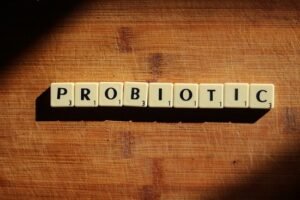In this post I’ll be covering probiotics and fertility- that is, the little beneficial critters that live in our gut!
Life is returning to normal, so I’m back to upgrading my fertility diet. I mentioned in my blog, Digestive Enzymes, Probiotics and Fertility, that I’ll be adding two critical – and missing – components to my fertility diet: probiotic bacteria and enzymes.
What are Probiotic Bacteria?
Probiotic bacteria are the friendly bacteria that live in our digestive systems. Doctors and nutritionists agree that these bacteria are one of the most important aspects to our overall health and well being.
Dr. McDougall refers to them in his book, Digestive Tune-up, as “so important to our health and survival that they should be thought of as a vital organ”. In her book, Allergies, by Carolee Bateson-Koch writes that the cultivation of these bacteria “can mean the difference between radiant health and chronic debilitating conditions”.
Benefits of Probiotic Bacteria
 It’s not a surprise that these little inhibitors are so important to us given the slew of responsibilities they have. Just to name a few of these responsibilities of probiotic bacteria:
It’s not a surprise that these little inhibitors are so important to us given the slew of responsibilities they have. Just to name a few of these responsibilities of probiotic bacteria:
- Break down our food
- Manufacture vitamins like biotin, niacin, folic acid and B-6
- Increase the absorption of minerals
- Normalize bowel transit time
- Produce antibiotics that prevent colonization of the harmful bacteria
A Micro-biome of Life in Our Digestive Tract
Interestingly, this micro flora isn’t just a few bacteria scattered throughout our digestive tract. Trillions of bacteria inhabit our digestive system. The bacteria weigh a total of about four pounds and account for half of the volume of the contents of our large intestine.
Where Does Our Gut Biome Come From?
These bacteria begin to colonize our bodies at birth; finding their way into our system through the air we breathe, the breast milk we drink and the things we put in our mouths.
We need to continuously replenish these bacteria, though, as many don’t set up camp permanently. They regularly exit our digestive systems – making up over half of the dry weight of feces – many of which are still living (if you who weren’t grossed out enough).
What Destroys Probiotics and Fertility?
Excretion isn’t the only factor affecting the bacteria balance in our gut. Bacterial infections, hormones, antibiotics (which kill the good and the bad bacteria), high stress levels, steroid drugs, excessive alcohol intake, poor diet, and a number of other factors can throw the beneficial bacteria out of balance.
Symptoms of Improper Balance of Probiotic Bacteria
This improper balance of flora can cause the following symptoms:
- Acne
- Arthritis
- Asthma
- Ear infection
- Fatigue
- Headaches
- Hormonal disturbances
- Intestinal symptoms
- Irregular heartbeat
- Low back pain
- Nervousness
- Rashes
So, probiotic bacteria are important to our health but what do they have to do with fertility?
Probiotics and Fertility- Can it Help?
There don’t seem to be any studies yet that directly link probiotic bacteria to fertility, but there are two aspects that make it very likely that these bacteria play a role.
- Probiotic bacteria influence our hormones. They break down and rebuild, for example, hormones such as estrogen. Knowing that an imbalance of estrogen can make getting pregnant harder it seems quite likely that a healthy bacteria balance will create a more fertile body.
- Probiotic bacteria manufacture important vitamins like biotin, niacin, folic acid and B-6. And not that it’s a surprise, but a recent study shows that vitamins may play an important role in getting pregnant (not to mention that folic acid is important for a healthy baby – reducing the chances of having a baby with neural tube defects).





